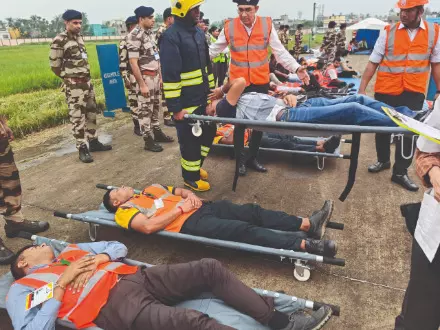Disaster preparedness: Kolkata airport conducts emergency drill

Kolkata: A full-scale emergency drill simulating an aircraft crash was recently conducted at Kolkata’s Netaji Subhas Chandra Bose International Airport, aiming to evaluate inter-agency coordination and the airport’s disaster preparedness mechanisms.
The simulation involved a scenario where an Air India aircraft, suffering an engine failure during arrival, skidded off the runway amid heavy rainfall and caught fire beyond the airport boundary. Though no real aircraft was used in the exercise, the setup was designed to replicate the complexity and urgency of a real aviation emergency.
The drill was conducted in compliance with directives from the Directorate General of Civil Aviation (DGCA) and the Bureau of Civil Aviation
Security (BCAS). Key departments of the Airports Authority of India (AAI), including Air Traffic Control (ATC), Airport Fire Services, and Operations, took part alongside external agencies such as the Central Industrial Security Force (CISF), National Disaster Response Force (NDRF), State Disaster Response Force (SDRF), Indian Coast Guard, medical teams, state police, fire services and NGOs like Saint John’s Ambulance.
Emergency response teams, including fire services and rescue units, reached the simulated crash site within the stipulated response time. Rescue operations, triage and casualty evacuation were conducted swiftly.
Bomb detection and disposal squads were also deployed as part of the operation. Ambulances transported mock casualties to ILS Hospital and Charnock Hospital to assess travel time under emergency conditions. The exercise caused a brief alarm among nearby residents due to smoke, sirens and the realistic staging of injuries. Airport authorities clarified that the public reaction was anticipated and factored into the simulation to measure ground-level response.
A debriefing session was held following the drill, led by airport director Pravat Ranjan Beuria, chief airport security officer, regional director of BCAS and a deputy director of DGCA. The session reviewed response timelines, coordination efficiency, and areas for improvement. Officials noted that such full-scale drills are typically conducted biennially, though this exercise was advanced following the June 12 crash in Ahmedabad that claimed 270 lives.



